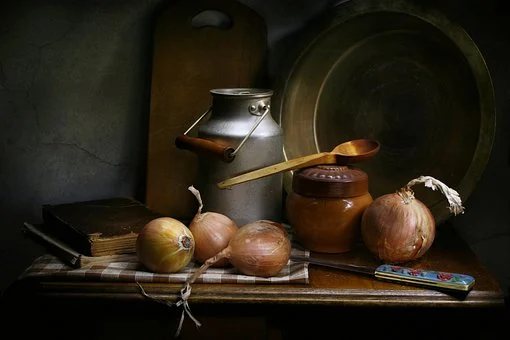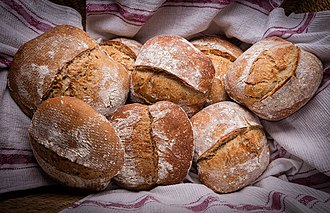I'm concerned. Concerned about the state of affairs internationally. Concerned about the lay of things within our own country. Concerned about where we are at spiritually and in the overall picture of things that God has had mapped out since time unfathomable.
We are not in a good place as far as the world goes, and we had better take notice, but I'm not about to go political (or quite theological) on you. Not so far as this post is concerned. But we are starting to experience supply-chain issues, inflation, and loss of production. This is leading me up to my decades-old curiosity about how things were done back in the day. Primarily I'm referring to storing food. These days some might consider me a (mild) prepper. Some might say I'm just using my common sense. Others might say, "We've been doing that since my great-grandpa fought in the Great War!"
I like to look back into the early years of American colonization and figure out how they did things back then and didn't all starve. Well, some did of course.
Let's have a look, and let's think about what we can do to stave off hardship during future shortages or simply times of personal hardship.
In early America, women were largely responsible for putting by. They were the ones who grew and gathered, then dried the herbs and vegetables, pickled the eggs, canned the fruit, stuffed the sausage, smoked the meat, rendered the fat, and so on. We think of having jams and jellies in our pantry as a luxury. They realized it was the best way to preserve fruit for winter--that and drying the food by spreading it in the sun, covered with a fine cloth to keep insects off, or else dried inside a slack oven. (That's an oven that's been heated and is cooling down.) I still haven't figured out how they kept mice and rodents out of their drying food or their smoked meat hanging from the rafters.
Speaking of meat, maybe you've noticed depleted meat departments in your local grocery store. I know I have. A couple weeks ago I went up to my local big name store and bought a huge pork tenderloin at a decent price. I brought it home, cubed up all but a normal roast-sized section, and canned it. I produced four quarts of pork out of that loin, plus one nice roast for the freezer. As I was canning, I popped the fat I'd trimmed off into a crockpot and rendered it so I'd have a little jar in the fridge for frying and greasing my bread pans.
I've baked bread for years, but I've always depended on having yeast. I no longer expect to have it when I need it. So at my ripe age, my daughter-in-law is teaching me the finer points of baking with sour dough. The use of sour dough as a starter dates all the way back to ancient Egypt. Our average colonial housewife would have been quite adept at using it.
I've been putting up extra dry foods in canning jars with oxygen absorbers--things I saw run out on the store shelves in 2020 such as flour, oatmeal, dry beans, rice, potato flakes, and so on. Meanwhile I'll still plant a large garden and put up fruits and vegetables like I normally do.
Back in the day, even our American forefathers depended upon imports like molasses, spices, sugar, and rum for aiding in their food storage and preparation. Many on the frontier soon learned how to use maple sugar too. I've gotten away from a lot of sugar (not all, of course) as well as store-bought pectin when preserving. I've been enjoying more maple syrup and honey purchased from my neighbors. In those old days, people also use sugar in a process aptly called "sugaring" in which fruit was preserved by packing it in heavy syrup (sugar water). Meanwhile, other types of food such as cabbage, eggs, meats, and other vegetables could be pickled too. The pickling process also releases vitamin C which prevents scurvy. So eat your pickles! (I confess that recently I sat down with a plateful of pickled beets to enjoy while I watched a movie. Yummy!)
Back in the day, even our American forefathers depended upon imports like molasses, spices, sugar, and rum for aiding in their food storage and preparation. Many on the frontier soon learned how to use maple sugar too. I've gotten away from a lot of sugar (not all, of course) as well as store-bought pectin when preserving. I've been enjoying more maple syrup and honey purchased from my neighbors. In those old days, people also use sugar in a process aptly called "sugaring" in which fruit was preserved by packing it in heavy syrup (sugar water). Meanwhile, other types of food such as cabbage, eggs, meats, and other vegetables could be pickled too. The pickling process also releases vitamin C which prevents scurvy. So eat your pickles! (I confess that recently I sat down with a plateful of pickled beets to enjoy while I watched a movie. Yummy!)
Learning about history isn't always just to help us picture the past, it's a way to give us knowledge and insight for the future--but of course you know that. Have you been going out of your way to "put by" a little extra lately?
Thinking back and planning ahead,
Naomi
www.naomimusch.com
Don't miss my three new releases in 2022! Each one nods to a different era from the past.









Naomi, what a timely and most interesting word! Brings back memories of my growing up with the huge gardens my father grew. We spent many a hot summer day and/or evenings picking, preparing, and stashing away canned beans, soup, freezing corn, etc. and I've even squeezed and canned grape juice--but that's a bit tricky.
ReplyDeleteThe Bible speaks of Israel who was like grape juice (wine) that hadn't set on its "lees"etc. My quarts of grape juice ended up in later months having some thick dark mush in the bottom. It has something to do with the finer points of canning it, and I don't have time to search back in my notes about it today. God bless you, hard-working, savvy, lady. BTW what is an oxygen absorber? I've certainly had a sour dough starter kept in my fridge in many past years. Wonder where I can get one to start today? Haven't done of this kind of storing up for years now at my senior age, although hubby of 58 years and I are real health nuts and PTL in great health. LOL I'm also totally into olive oil vs. any kind of pork. Please send your answers to my email: elvacmartin@gmail.com And here's my web site for more about me and my historical romances www.elvamartin.com
Blessings and Onward in our Faith Journey!
Elva Cobb Martin
Anderson, SC
Hi, Elva! Thanks for the response. I remember my mom and dad making juice and having some of that sediment on the bottom also. I'll have to look up that passage about the "lees". An oxygen absorber is one of those little packets you see in some containers (not to be confused with silicon) that sucks the oxygen out of the space and effectively seals the jar. I bought mine off Amazon. I had a whole bunch of jars ready and filled--oatmeal, flour, beans, rice, potato flakes... and then popped them in. I didn't want to open them and expose them to air until the jars were all ready. The leftovers I sealed in a small jar, and hopefully they'll keep. We'll see.
DeleteGreat post. I make my own beef jerky and I've had a batch of sourdough I've bee using for decades.
ReplyDeleteThat's great, Janet! I used to occasionally make venison jerky. Nothing in heaps, and we ate it pretty quickly. Been a long time. That's so cool about your sour dough starter. Decades is a long time to keep something like that going. Wow!
DeleteExcellent post! THANKS for sharing? What is an oxygen absorber? I buy my oatmeal, dried fruits & nuts from an Amish bulk food store & use gallon canning jars for the oatmeal, w/ bay leaves in each jar, and quart jars for the dried fruits & roasted nuts--raw nuts are in the freezer... I heat w/ fuel oil, and... typically fuel oil costs about what the current gas prices are & historically, I use approximately 570 gallons per winter... any suggestions on how to save $ heating my home in NE Ohio? Thanks again for a great article!
ReplyDeleteGetting bulk is great! The oxygen absorbers are little square packets that you plop into a jar (they look like those little packets you see in containers from time to time, but not silicon) and they suck out the oxygen and seal the jar. I bought them off Amazon. When you open a package of them, you have to put the spares into a small jar and seal them up tight to keep them or they'll go to waste. I learned about them off of Youtube from a video by the "Provident Prepper". I'm curious about the bay leaves. I'd not heard of that. What do they do? Fuel oil...whew. We have burned wood almost our entire married life. We did put in a new fuel oil furnace last year as backup and since we know we aren't maybe going to always be able to do the work of wood. BUT, this year I've been adamant about not turning it on because of cost. I wish I had a solution for you. Everything is going up. Insulate, insulate! :/
DeleteThank you for sharing. I raise a garden and have berries and fruit trees so I can a lot. We also make maple syrup, fish for trout, freeze or can venison and make jerky from it. I buy local honey as that is cheaper than trying to raise bees although we did take bee keeping classes. You can also make salt rising bread by making a starter the night before. Blessings
ReplyDeleteWe have a lot in common, Lucy! I don't do maple syrup, but I buy it locally and the same with honey. I have a nephew who raises bees, and it does seem to come with its challenges. I haven't heard of the salt rising bread. Thanks for telling me about that. I'll have to look into it!
DeleteWe have been buying in bulk and storing up dry goods and other non-perishables. We plan on doing some canning this year, as well. My husband and I grew up like this anyhow. We lived in Florida where the hurricanes can easily knock power out for weeks and so it was always good to be prepared. We love to have the veggies from the garden to can or freeze. With us, we had gotten away from it for a couple of years, but have been slowly adding back to the country lifestyle that we grew up in. :)
ReplyDelete